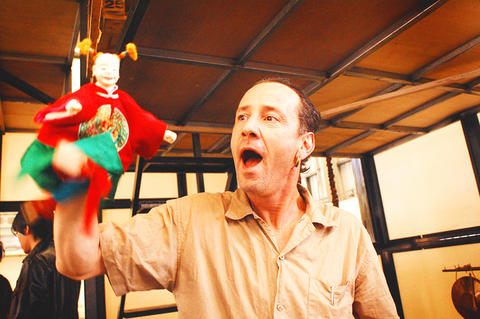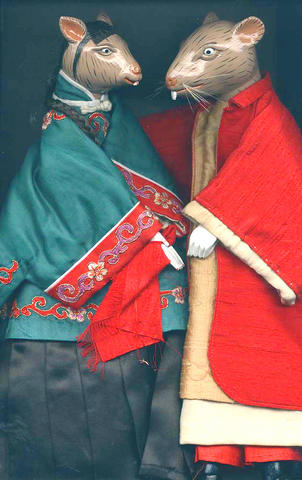The Lunar New Year, which will usher in the year of the rat, is nearly upon us, and the Taiyuan Puppet Theater Company (TPTC, 台原偶戲團) has revived The Wedding of the Mice (大稻埕的老鼠新娘) to honor the occasion. The production, which opens tomorrow, is an innovative puppet show designed to appeal to both children and adults. The company, in its effort to push puppetry out of the nursery into mainstream contemporary theater, is also working with the French puppet troupe Les Zonzons on another project at the Taipei Artist Village (TAV, 台北國際藝術村).
The Wedding of the Mice was first performed in 2002. It is an adaptation of a traditional Chinese tale, with a script by Robin Ruizendaal, TPTC's artistic director, and features European rod puppets as well as Taiwanese glove puppets.
A story teller, played by Wu Shanshan (伍姍姍), makes the setup particularly accessible to children, while the production's innovative score - a combination of contemporary Western and Chinese classical music - gives the show an artistic edginess that appeals to adults.

PHOTO COURTESY OF TPTC THEATER COMPANY
The Wedding of the Mice begins with the narrator recalling a childhood experience in which she visited the mansion of the mouse lord, whose daughter is expected to marry whichever suitor succeeds in catching a ball of red silk. The daughter is, in fact, in love with a poor mouse who her father thinks unworthy and who is unable to compete. Needless to say, true love, with the help of the narrator, eventually wins the day and a great celebration is held. In Chinese legend, the wedding of the mice takes place on the third day of the Lunar New Year, when traditionally people scatter salt, rice and cake crumbs in their houses for the celebration.
TPTC's project with Les Zonzons, La Boite or The Box, is in rehearsal stages at the TAV. The title refers to the cases in which puppets are kept when they are not being used. In this play, the box has been expanded into a metal frame covered with removable canvas panels and separated into a bi-level performance area, allowing for multiple levels of presentation: the "stages" that are cut into the box, the canvas screens behind which shadow puppets are manipulated, the projections onto the screens and the inside of the box, which is seen when the screens are removed.
Though the official opening of the show will be in Lyon, France in March and it won't premier in Taipei until the Taipei International Arts Festival in August, a preview is scheduled for Jan. 26.

PHOTO COURTESY OF TPTC THEATER COMPANY
La Boite is the brainchild of Chung Chih-chia (鍾志佳), a Taiwanese curator based in Paris. Chung, who grew up in rural Taiwan where puppetry was an integral part of the culture, said he wanted to bring the two puppet troupes together. "I wanted to do this for the same reason that we travel. When you put different things together, you want to see what will emerge," he said in an interview with the Taipei Times.
"We are constantly looking for ways of making puppet theater really contemporary," said Ruizendaal, "rather than always being considered something associated with folklore or children's theater." Cooperation between TPTC and Les Zonzons is just one more instance of the group's efforts to get Taiwanese glove puppetry taken seriously as a useful tool for contemporary theater.

Behind a car repair business on a nondescript Thai street are the cherished pets of a rising TikTok animal influencer: two lions and a 200-kilogram lion-tiger hybrid called “Big George.” Lion ownership is legal in Thailand, and Tharnuwarht Plengkemratch is an enthusiastic advocate, posting updates on his feline companions to nearly three million followers. “They’re playful and affectionate, just like dogs or cats,” he said from inside their cage complex at his home in the northern city of Chiang Mai. Thailand’s captive lion population has exploded in recent years, with nearly 500 registered in zoos, breeding farms, petting cafes and homes. Experts warn the

The unexpected collapse of the recall campaigns is being viewed through many lenses, most of them skewed and self-absorbed. The international media unsurprisingly focuses on what they perceive as the message that Taiwanese voters were sending in the failure of the mass recall, especially to China, the US and to friendly Western nations. This made some sense prior to early last month. One of the main arguments used by recall campaigners for recalling Chinese Nationalist Party (KMT) lawmakers was that they were too pro-China, and by extension not to be trusted with defending the nation. Also by extension, that argument could be

Aug. 4 to Aug. 10 When Coca-Cola finally pushed its way into Taiwan’s market in 1968, it allegedly vowed to wipe out its major domestic rival Hey Song within five years. But Hey Song, which began as a manual operation in a family cow shed in 1925, had proven its resilience, surviving numerous setbacks — including the loss of autonomy and nearly all its assets due to the Japanese colonial government’s wartime economic policy. By the 1960s, Hey Song had risen to the top of Taiwan’s beverage industry. This success was driven not only by president Chang Wen-chi’s

Last week, on the heels of the recall election that turned out so badly for Taiwan, came the news that US President Donald Trump had blocked the transit of President William Lai (賴清德) through the US on his way to Latin America. A few days later the international media reported that in June a scheduled visit by Minister of National Defense Wellington Koo (顧立雄) for high level meetings was canceled by the US after China’s President Xi Jinping (習近平) asked Trump to curb US engagement with Taiwan during a June phone call. The cancellation of Lai’s transit was a gaudy